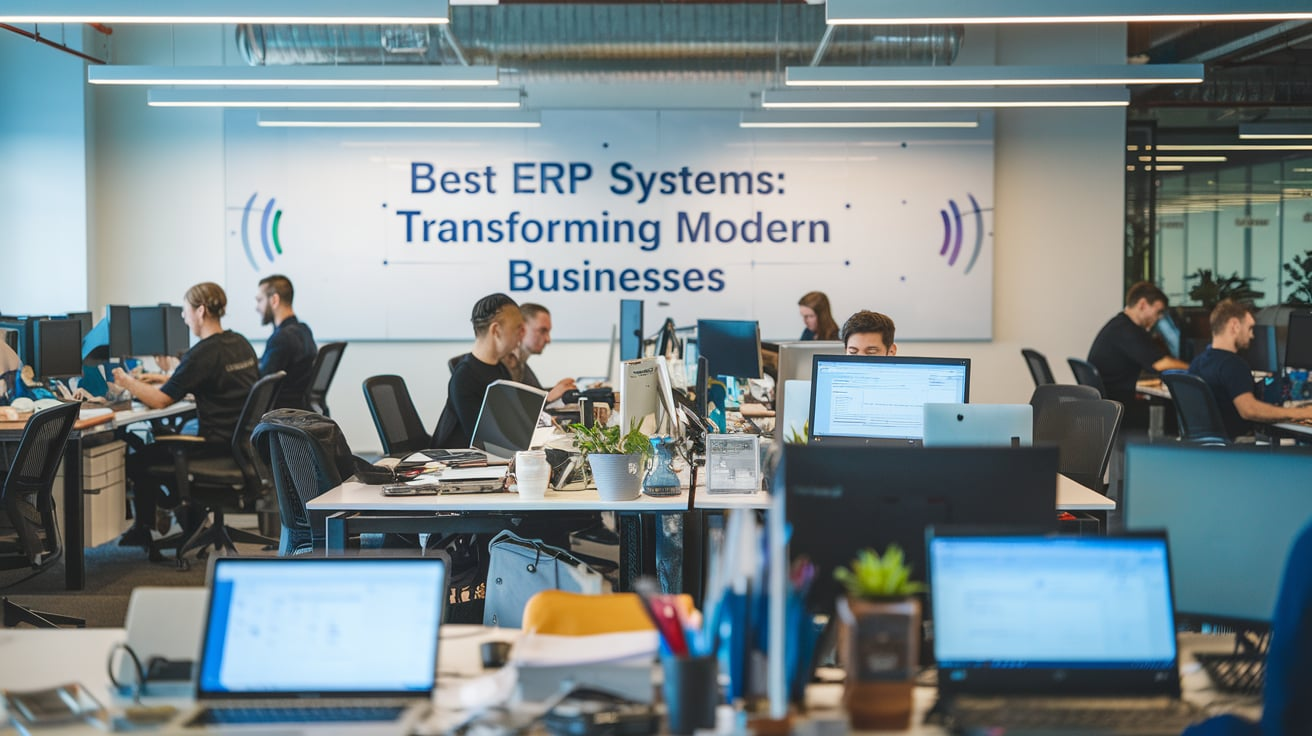Introduction
The best ERP systems have become essential tools for modern organizations. ERP, or Enterprise Resource Planning, integrates core business processes into a unified system, enhancing productivity, accuracy, and collaboration. This article will explore the best ERP systems available, their benefits, and how to choose the right one for your needs.
What is an ERP System?
An ERP system is software that centralizes data and automates business functions across various departments, including finance, human resources, sales, and supply chain management. The best ERP systems streamline operations, reduce redundancies, and provide real-time insights, helping companies make informed decisions.
Key Features of the Best ERP Systems
The best ERP systems offer many features that cater to different business needs.
1. Centralized Database: Allows all departments to access the same information.
2. Modular Design: Companies can choose modules based on their requirements, such as inventory or customer relationship management (CRM).
3. Customization: The best ERP systems offer customization to fit unique business processes.
4. Scalability: As businesses grow, ERP systems should expand seamlessly.
5. Cloud-Based Options: Many modern ERP systems offer cloud deployment, providing flexibility and remote access.
Top ERP Systems in the Market
Here’s a look at some of the best ERP systems widely recognized for their performance and reliability:
1. SAP ERP
SAP is a global leader in ERP solutions. Known for its powerful features, it’s ideal for large enterprises looking for extensive customization and advanced analytics.
2. Oracle ERP Cloud
Oracle’s cloud-based ERP solution provides comprehensive tools for finance, procurement, and project management. It offers strong data security and supports various industries.
3. Microsoft Dynamics 365
This system integrates well with other Microsoft products like Office 365. It’s highly flexible and suitable for small to medium-sized businesses.
4. Infor CloudSuite
Infor focuses on industry-specific solutions, making it one of the best ERP systems for manufacturing, healthcare, and hospitality.
5. NetSuite ERP
NetSuite, owned by Oracle, is a cloud-based solution ideal for growing businesses. It offers financial management, CRM, and e-commerce capabilities.
Benefits of Using the Best ERP Systems
Investing in the best ERP systems brings numerous advantages:
1. Enhanced Efficiency: Automates repetitive tasks, allowing employees to focus on strategic activities.
2. Improved Data Accuracy: Centralized data reduces errors and ensures consistency across departments.
3. Better Decision-Making: Real-time analytics provide insights that help in making data-driven decisions.
4. Cost Savings: Streamlined operations reduce operational costs and improve ROI.
Challenges in Implementing ERP Systems
While the best ERP systems offer many benefits, implementation can be challenging.
1. High Costs: Initial investment and ongoing maintenance can be expensive.
2. Complexity: The learning curve for employees may require extensive training.
3. Customization Needs: Aligning the ERP system with existing processes can be complex.
However, proper planning and choosing the right system can mitigate these challenges.
How to Choose the Best ERP System for Your Business
1. Business Needs: Identify specific problems the ERP system will solve.
2. Budget: Ensure the system fits within your financial resources.
3. Vendor Support: Reliable customer support is essential for smooth implementation and ongoing maintenance.
4. User-Friendly Interface: Ensure the system is easy for employees to use.
Industry-Specific ERP Solutions
The best ERP systems often provide industry-specific modules.
1. Manufacturing: Focus on production planning, quality control, and inventory management.
2. Retail: Manage supply chains, sales, and customer data.
3. Healthcare: Streamline patient records, billing, and regulatory compliance.
Choosing an industry-specific solution ensures that the ERP system aligns with your unique business processes.
Cloud vs. On-Premise ERP Systems
When considering the best ERP systems, businesses must choose between cloud-based and on-premise solutions.
1. Cloud-Based ERP: Offers flexibility, remote access, and lower upfront costs.
2. On-Premise ERP: Provides better control over data but requires significant infrastructure and maintenance.
Many companies now opt for cloud-based ERP systems for easy access and cost-effectiveness.
Future Trends in ERP Systems
The future of ERP is evolving with technology advancements.
1. Artificial Intelligence (AI): Enhances automation, predictive analytics, and decision-making.
2. Mobile Access: The best ERP systems offer mobile applications, allowing access on the go.
3. Blockchain: Ensures secure and transparent transactions.
These trends indicate that ERP systems will become more intelligent, accessible, and secure.
Common Misconceptions About ERP Systems
Some misconceptions prevent businesses from adopting the best ERP systems:
1. Too Expensive: While initial costs can be high, the long-term ROI often justifies the investment.
2. Only for Large Companies: Many ERP systems cater to small and medium businesses.
3. Difficult to Implement: Implementation can be smooth and successful with the right planning.
Steps for Successful ERP Implementation
To ensure the best ERP system implementation:
1. Define Clear Goals: Identify what you want to achieve with the ERP system.
2. Choose the Right Vendor: Select a provider known for quality and support.
3. Train Employees: Proper training ensures smooth adoption.
Why Businesses Need the Best ERP Systems
In today’s competitive landscape, businesses must operate efficiently. The best ERP systems centralize processes, reduce errors, and improve collaboration. They provide a strategic advantage, helping companies adapt to market changes and customer needs.
Conclusion
The best ERP systems are more than just software—they are transformative tools that enhance efficiency, accuracy, and decision-making. Choosing the right ERP system can significantly impact your success, whether a small business or a large enterprise. Understanding your needs and exploring the top options allows you to implement a system that drives growth and innovation.

